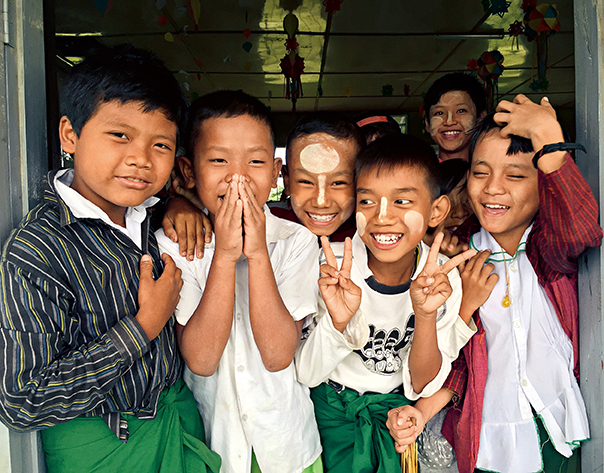
Students waiting for “panda packs”in a classroom in Shan State,Myanmar.
At the age of 13,a boy named Mg Zwe Htet Paing from Kyaukpyu Township,Myanmar,lost his father in a shipwreck.His mother fell ill,and the family's income was cut off when she could no longer work.The situation went from bad to worse.
Mg Zwe Htet Paing's home was the only in the village without electricity.The house was sagging and dilapidated,and simple survival had become an overwhelming burden.Good-hearted people from around the village sometimes helped the family with some food and found odd jobs for his mother.
Despite such troubles,Mg Zwe Htet Paing still loved to learn,and his academic performance remained among the best at school.Fortunately,a year after losing his father,Mg Zwe Htet Paing was awarded a scholarship from the China Foundation for Poverty Alleviation(CFPA)for his outstanding performance,which pledged to provide 300,000 kyats(about US$226)a year until he went to college.
“He told us that 300,000 kyats a year was a huge sum of money,enough to save him and his mother from worrying about surviving for a whole year,”said Lin Yuan,director of the CFPA Myanmar Office.“If they lived frugally,they could make that money last for 18 months.He said he was honored to receive the scholarship and pledged to go to college to provide a better life for his mother.”
Lin shared this story at the 5th anniversary meeting of the establishment of the CFPA Myanmar Office,on December 8,2020,through video.Because of the pandemic,Lin was unable to return to China to attend in person.Normally,she returns to China to report on her work every six months,but this time she had remained in Myanmar for 10 consecutive months.
“In the college entrance examination in August this year,Mg Zwe Htet Paing got the top score in Rakhine State and sixth in the country,”added Lin.“He went to college just like he pledged.”
A humble gesture changed a child's life trajectory and kindled hope for the whole family.Lin Yuan and her colleagues enjoy many such success stories.Since the CFPA Myanmar Office was established in 2015,Lin's team has gradually grown from just her to 10 employees and accumulated funds and supplies worth 48.4 million yuan(US$7.4 million).Their projects have served 109 towns and villages in Myanmar and benefitted nearly 330,000 people.
Over the past five years,Lin's work situation changed with the implementation of each project.Before she was stationed in Myanmar in 2016,her luggage was always packed.
“Every time a mission was successfully completed,I was eager for approval from my boss to allow me to fly back to China,”Lin Yuan recalled.“But the headquarters often asked me to stay on for a few more tasks before returning to China.In contrast,now they often ask me,‘When do you plan to return?’”
“In Myanmar,we have been able to meet more beneficiaries in person,contact local officials,and meet a lot of business representatives,media workers,and peers stationed in Myanmar,”Lin said.“We are not alone anymore.We have more confidence in our work here.”
Focus on Education
Education is an important part of CFPA work in Myanmar.According to the 2014 Myanmar census,only 81 percent of children aged 6 to 8 attended school,which meant nearly one in five children was unable to attend school.One of the most common reasons hindering school attendance was unaffordable education-related expenses.
Years ago,the Myanmar government introduced Myanmar National Education Strategic Plan(2016-2021) to promote educational reform.During the period,the CFPA Myanmar Office launched the Paukphaw Scholarship Project,the China-Myanmar Friendship Scholarship Project,and the Panda Pack Project to provide assistance to poor students.
Win Shwe Yee Nyein received an award from the Paukphaw Scholarship Project.One day in June 2017,upon returning home from school,she went straight to a family photo instead of starting her afternoon chores.Her mother assumed she was missing her father,who had passed away years before,considering the tears running down her cheeks.
The girl reported to her mother that she had been awarded a grant from China.“They not only gave us grants,but also organized training activities,”she said.“Although Dad is gone,I feel like he sent his love from beyond.”Win Shwe Yee Nyein also got the opportunity to visit and study in China.Today,she has a new lease on life after completing college and securing stable employment.
In addition to providing direct financial assistance to Myanmar students,the CFPA has adapted its operations to meet the actual needs of students and improve their learning conditions.In Myanmar,a lack of electricity is a widespread problem,especially in the northern mountainous areas where steep terrain makes access to the power grid difficult.In areas lacking electricity,children use candles to study.In view of this inconvenience,the CFPA Myanmar Office introduced a solar lantern project this year,providing nearly 400 solar lanterns to villagers in Myitkyina,Kachin State,to improve lighting conditions.
The International Bicycle Project is another new poverty alleviation project launched in 2020.In rural Myanmar,it takes up to two hours for some middle school students to walk to school,and many families cannot afford bicycles.The CFPA teamed up with local NGOs to donate nearly 2,000 bikes to students in need.
The Panda Pack Project provides school supplies to Myanmar children.Since its launch in June 2018,panda-printed school bags have been donated to more than 280,000 children in Myanmar.
“Our programs in Myanmar focus on education because we believe that investing in education nurtures a country's future,”said Chen Hongtao,standing deputy secretary-general of the CFPA.He said the CFPA will consider any project capable of helping children while concurrently solving social problems.He called for more organizations and institutions to work together to contribute to poverty alleviation through education.
Solving the Most Practical Problems
Aung Aung is a primary school student in Yangon.Without drinking water at his school,children had to go to a nearby temple to get a drink.It is warm year-round in Myanmar,so water shortages and thirst have been common problems for children.In response to the situation,the CFPA Myanmar Office recruited companies to donate water purifiers and tanks to Aung Aung's school.With clean drinking water on-site,students of the school are no longer pushed off campus by thirst.
According to a survey from the World Health Organization,about 77 percent to 84 percent of the urban population in Myanmar has access to clean water,and that figure is 74 percent in rural areas.In Rakhine State and northern Shan State,access to clean water is 48 percent and 68.3 percent,respectively.The CFPA Myanmar Office has been helping schools and rural areas improve water provision since 2019 by installing water purification equipment and other infrastructures in residential communities and schools.So far,approximately 5,600 students have benefitted from better access to clean drinking water.
Early in 2020,the COVID-19 pandemic suddenly cut off the income stream of many working-class Myanmar people.Hunger became a real problem quickly.“In response to the situation,we started distributing food parcels to elementary school students,”Lin Yuan said.The parcels included rice,cooking oil,noodles,beans,and other food.As of October 2020,the first phase of this project had successfully distributed food to 2,095 students in 20 townships in Yangon.
Mg Thet Ko Ko,a fifth grader,is a beneficiary of food parcel distribution.He lives with two younger brothers and his parents.Thet's parents both worked in a restaurant for a daily wage of 7,000 kyats(US$5.3)each.The pandemic caused a steep drop in customer flow,so they hardly took home anything.
“I want to give a heartfelt thanks to the Chinese people for their donations,”said Thet's mother.“This food will nourish us for at least the next two weeks.”
Pyie Phyo Kyaw joined the CFPA Myanmar Office in 2018 and participated in distribution of food parcels.He recognized that the COVID-19 pandemic has hit poor families hardest,sucking away their income and pulling their children out of school.Recipients of food parcels told him the effort solved their most pressing problems and afforded a rare breath of relief.
“It's not just food,”remarked Pyie Phyo Kyaw.“We are bringing psychological comfort to poor children and their families.”
The Smiling Children Feeding Program(Food Distribution)has attracted the attention of the local Myanmar government and media.The Yangon provincial government praised the CFPA Myanmar Office for its work during the pandemic.Pyie Phyo Kyaw insisted that the pandemic is not over yet and expressed hope that distribution of food parcels would continue.
Promoting More Effective Poverty Reduction
“According to a report jointly prepared by the Central Statistical Organization of Myanmar,the World Bank,and the United Nations Development Programme,Myanmar's poverty rate dropped significantly from 48.2 percent in 2005 to 24.8 percent in 2017,”said U Han Win Aung,minister counsellor of the Myanmar Embassy in China,at a recent meeting.“But poverty remains an important issue in Myanmar.Myanmar must continue its efforts to drive rural development and promote poverty reduction.”
The significant drop in poverty has been attributed to Myanmar's rapid economic development.From 2005 to 2017,Myanmar maintained a high annual per capita GDP growth rate of 7.8 percent,best in Southeast Asia.Myanmar's poverty reduction efforts,while remarkable,are far from over.
The report cited by Minister Counsellor U Han Win Aung in his speech also employed data to illustrate persisting poverty: In Myanmar,nearly 12 million people,about 24.8 percent of the total population,remain in poverty.About a quarter of the total population still struggles to get by on 1,590 kyats(US$1.2)or less per person per day.In Chin State,which has the highest poverty rate,almost six out of 10 people are poor.Poverty is much more widespread in rural areas than cities.About 87 percent of impoverished people live in rural areas.
“Our current projects only meet urgent needs and provide emergency assistance to the poor,”conceded Lin Yuan.She and her colleagues sometimes feel powerless.The government's poverty alleviation policies remain the most important and effective measures.
Like other countries,Myanmar's economy has been dragged down by the pandemic,and poverty issues have become more glaring.In response,the Myanmar government has introduced measures to overcome the negative impacts.In April 2020,the Myanmar government rolled out the COVID-19 Economic Relief Plan(CERP).
According to a September report by The Myanmar Times,the CERP has allocated a combined US$2 billion in cash and food assistance for the poor while also relieving economic pressure on Myanmar's industrial and business communities.
“The COVID-19 pandemic has not only hit the poor the hardest,but also created new impoverished people,”said Victoria Kwakwa,World Bank Vice President for East Asia and Pacific.“The Southeast Asia region as a whole is facing an unprecedented challenge.”
At the government level,China and Myanmar have been strengthening cooperation on poverty reduction,and the pandemic did not impede joint work.In March 2020,China and Myanmar signed an agreement involving China providing more than US$6.7 million to Myanmar through the Lancang-Mekong Cooperation Special Fund to fund 22 projects to benefit Myanmar people in areas of agriculture,education,and information technology.In August 2020,the first wave of projects were launched.
In November 2017,China and Myanmar signed a cooperation agreement on a poverty reduction project involving two villages on the outskirts of Nay Pyi Taw.The project seeks not only to build infrastructure and improve public services,but also expand channels for increased income and enhance self-development abilities.The project is scheduled to finish in the first half of 2021 and expected to benefit approximately 6,700 farmers in 1,481 households.
While poverty reduction cooperation between governments is very important,the efforts of NGOs are also indispensable.“An important feature of non-profit organizations is sustained engagement in community development projects over long stretches of time,”said Wang Xingzui,executive vice president of CFPA.“We design long-term projects that can take five or even 10 years to be completed.We place special attention on the capacity building of local partners and sustainability of the projects.Many projects must continue for extended periods to solve problems effectively.As an NGO,we can provide practical assistance and help foster closer people-to-people ties.”
(All photos provided by CFPA)
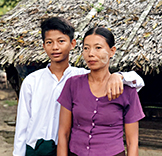
Mg Zwe Htet Paing with his mother.
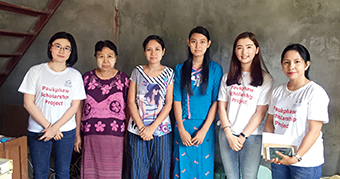
Win Shwe Yee Nyein(third right)and staff of the CFPA Myanmar Office.
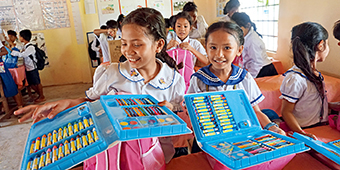
Primary school students in Cambodia receive “panda packs”on May 11,2018.
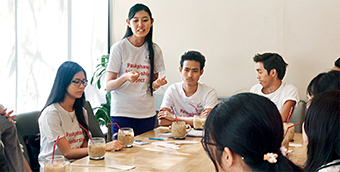
Win Shwe Yee Nyein(standing)shares her experiences after a trip to China.
L0057.T001.JPG
According to a survey from the World Health Organization,about 77 percent to 84 percent of the urban population in Myanmar has access to clean water,and that figure is 74 percent in rural areas.In Rakhine State and northern Shan State,access to clean water is 48 percent and 68.3 percent.
L0057.T002.JPG
Myanmar's poverty rate dropped significantly from 48.2 percent in 2005 to 24.8 percent in 2017.

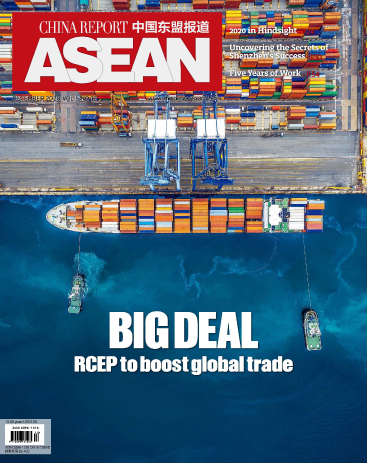
 Copy Reference
Copy Reference